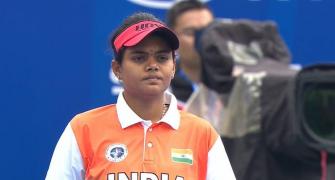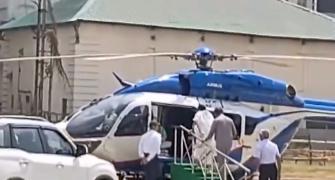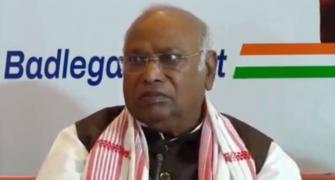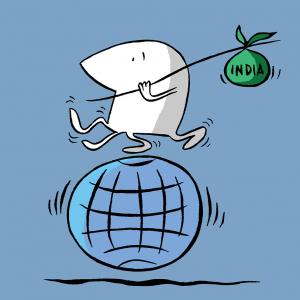Six years after the rollout of the biggest indirect tax reform in India, Goods and Services Tax (GST) revenue of Rs 1.5 lakh crore every month has become a new normal and tax officers are focusing on dealing with fraudsters who are adopting newer modus operandi to game the system, causing loss to the exchequer.
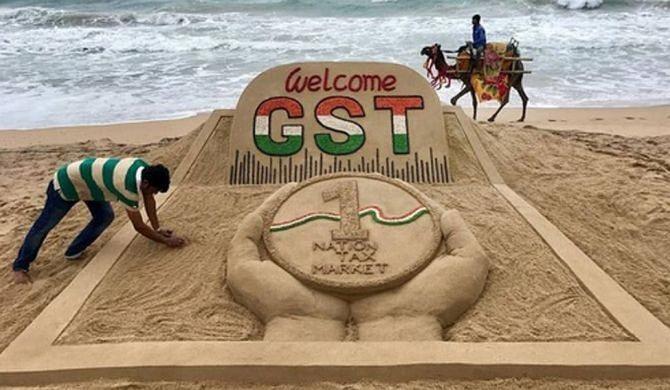
To apprehend black sheep, who operate as syndicates and create fake entities on the basis of forged documents to claim input tax credit (ITC), tax officers have started using data analytics, artifical intelligence and machine learning aiming to curb evasion, which was over Rs 3 lakh crore since inception of GST. It was over Rs 1 lakh crore in 2022-23.
Thinktank Global Trade Research Initiative (GTRI) said the most critical pending GST reform is upgradation of GST Network to prevent fake supplies and fraudulent claims of Input Tax Credit (ITC).
“Data analysis and physical checks alone cannot completely solve the problem.
"The GSTN should enable linking of invoice level information filed for claiming ITC by buyer (from GSTR 3B) with the information provided by input suppliers (GSTR 2A and GSTR 2B),” Srivastava said.
Even after six years, the GSTN is unable to connect the supplies in a value chain, resulting in significant revenue loss to the government and causing problems for honest businesses, Srivastava added.
Issues like rationalisation of tax rates and slabs, levying GST on petrol, diesel and ATF, are still hanging fire. Tax experts are of the opinion that the GST Council must pursue these reforms to make GST more inclusive.
However, in an election year, it is unlikely that the Centre and states will go ahead with these reforms.
Nangia Andersen India, director - Indirect Tax, Tanushree Roy said simplification of the GST rate structure would provide a fillip across sectors, however with elections round the corner a wait-and-watch approach needs to be adopted to see if the Government at all decides to allude to this issue.
“Some of the areas on which industry expects more clarity from the GST Council and should be considered on priority pertain to levy/ applicability of GST on Winnings from online gaming; transactions involving cryptocurrency; EV charging infrastructure, and setting up of GST Appellate Tribunals,” Roy said.
The GST Council which is chaired by Union Finance Minister, has met 49 times since it was set up in September 2016.
The members of the Council, the apex decision-making body with regard to policy making and GST rate decision, include finance ministers from all states and UTs, besides the minister of state in the Union finance ministry.
A nationwide GST, which subsumed 17 local levies like excise duty, service tax and VAT and 13 cesses, was rolled out at the stroke of midnight on July 1, 2017.
Under GST, a four-rate structure that exempts or imposes a low rate of 5 per cent tax on essential items and a top rate of 28 per cent on luxury and demerit goods is levied. The other slabs of tax are 12 per cent and 18 per cent.
Besides, there is a special 3 per cent rate for gold, jewellery and precious stones and 1.5 per cent on cut and polished diamonds. Besides, a cess is levied on the highest tax slab of 28 per cent on luxury, sin and demerit goods.
In the pre-GST era, the total of VAT, excise, CST and their cascading effect led to 31 per cent as tax payable, on average, for a consumer.
The monthly GST revenues, which used to be Rs 85,000-95,000 crore when GST was launched in 2017, have soared to around Rs 1.5 lakh crore and are moving northwards.
The revenue touched an all-time high of Rs 1.87 lakh crore in April 2023.
With monthly revenues seeing a steady increase, the GST officers are now focussing more on apprehending fraudsters and curbing tax evasion.
The Central Board of Indirect Taxes and Customs (CBIC) has launched a two-month-long special drive to weed out fake registration under GST and apprehend the mastermind behind all cases of tax evasion.
GST Network has identified 60,000 entities which could be having fake registration.
Of these, on 43,000 entities, physical verifications by way of visiting business premises have been completed by central and state tax officers.
Following this, 11,140 fake GST registration, involving GST evasion of over Rs 15,000 crore, have been detected by taxmen during the first month of the drive.
Srivastava said the current flaw in the system allows buyers to claim ITC without actually receiving supplies from fraudulent suppliers.
"The government conducts drives and physical checks to detect such frauds, but these measures inconvenience honest businessmen and have limitations in detecting fraud.
"Making registration more difficult will not solve the problem,” he said.
The total number of Goods and Services Tax (GST) evasion cases too had gone up with about 14,000 cases detected in 2022-23, up from 12,574 cases in 2021-22 and 12,596 cases in 2020-21.
The current flaw in the system allows buyers to claim ITC without actually receiving supplies from fraudulent suppliers.
Let's take the example of E-Rickshaw: Firm A produces batteries with an 18 per cent GST, costing Rs 100. Firm B places an order for one battery, paying Rs 118 to Firm A.
In a legitimate transaction, Firm A keeps Rs 100 and deposits Rs 18 as GST.
Firm B claims an ITC of Rs 18 on this supply, which can be used to pay GST or obtain cash refunds for exports.
However, in a fraudulent transaction, Firm A issues invoices without actually supplying the battery or paying tax.
Yet, Firm B still claims ITC based on the information provided by Firm A.
GST authorities arrested 1,402 persons for evading taxes between July 1, 2017, and February 2023.
KPMG National Head & Partner Indirect Tax Abhishek Jain said, "With GST now mostly having stabilised and a positive outlook of most industries, definitely, the time is ripe to consider the inclusion of excluded products.
"This would help complete fungibility and limiting cascading effect of taxes on these supplies.”





